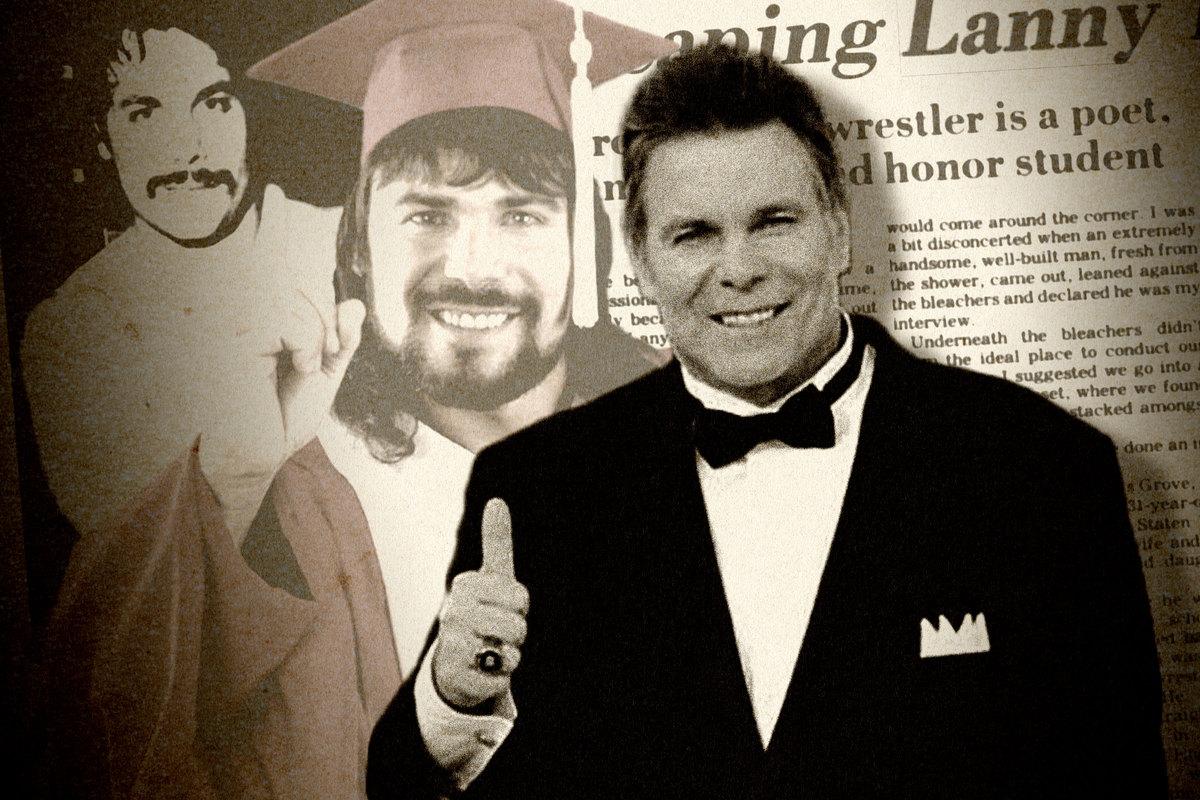
“Leaping” Lanny Poffo—better known to many WWF and WWE fans as the poetry-reciting, cap-and-gown-clad Genius—died this week at the age of 68. Poffo was the last surviving member of a wrestling mini-dynasty that included territorial star father Angelo Poffo, who wrestled from 1949 until the 1980s, and older brother Randy “Macho Man” Savage, one of the sport’s most colorful personalities and intense in-ring performers. Angelo and Randy passed in 2010 and 2011, respectively, so Lanny had spent the better part of the past decade honoring their legacy at the various wrestling events he attended.

For the tight-knit Poffo clan, nothing mattered more than family. And Lanny, who was the spitting image of broad-shouldered, square-jawed Angelo, took the Poffo legacy seriously. Although Lanny played high school baseball alongside his brother and showed promise—a 1972 Chicago Tribune article quotes Angelo as saying that both Randy and Lanny wanted to be big-league catchers—only Randy pursued that dream in the St. Louis Cardinals and Cincinnati Reds farm systems. Lanny wrote in his comic-book autobiography that “I knew in my heart that professional baseball was not the path that I would follow”; he wanted to train at the feet of Angelo, who had a successful wrestling career in the 1950s and 1960s.
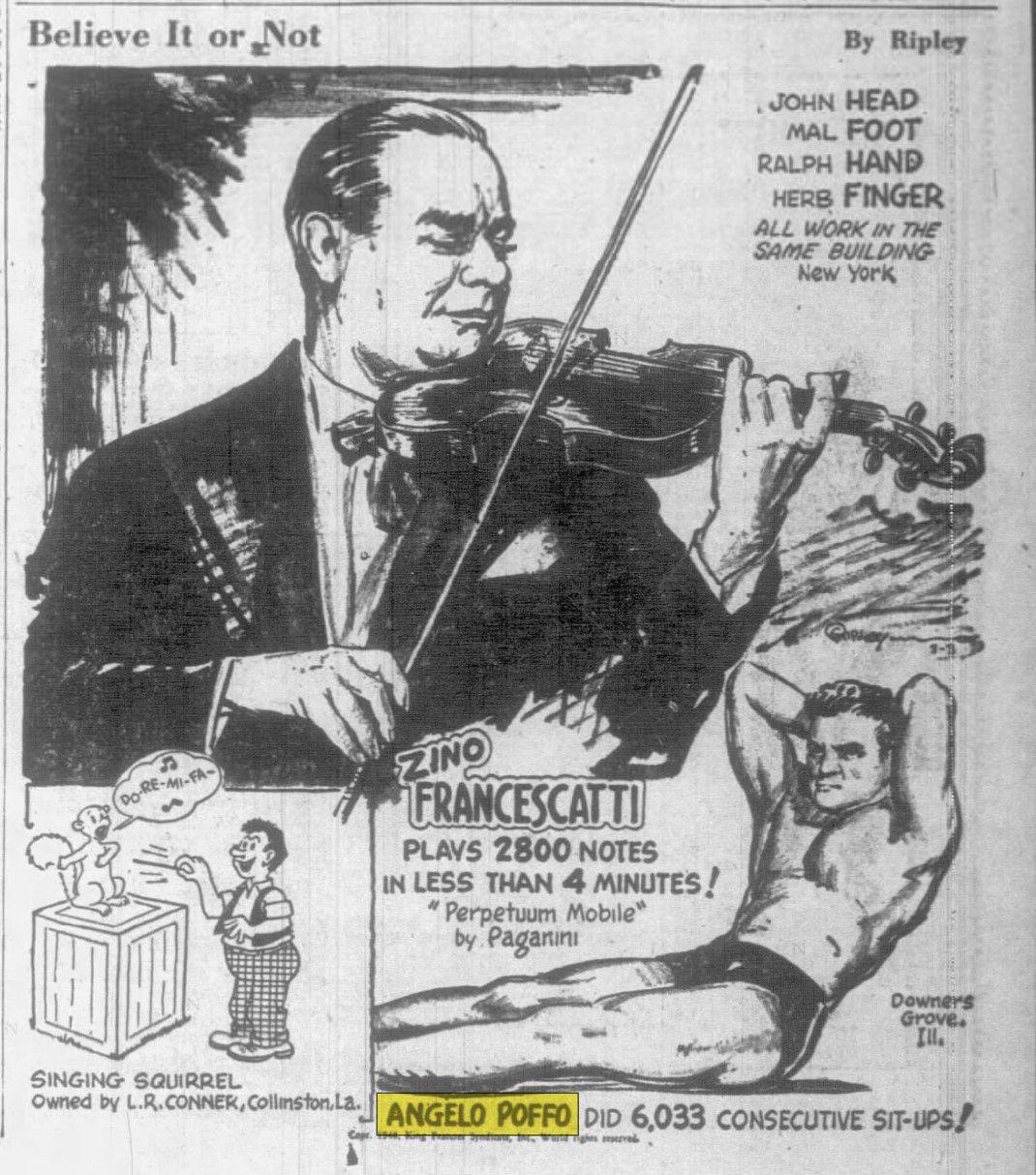
Angelo had built his reputation on general athleticism—he was one of the better-built and more mobile wrestlers of his era—as well as a startling 1945 feat of strength that won him acclaim as a world-record holder: He completed 6,033 sit-ups in 4 hours and 10 minutes while serving in the U.S. Navy (the extra 33 reps were in commemoration of Jesus’s 33 years of life; both Angelo and Lanny were religious, and neither failed to mention the extra 33 reps when discussing Angelo’s achievement). Angelo’s base of operations was the Midwest; he served as a main-event mainstay for Fred Kohler’s Illinois-based wrestling promotion, held the Chicago version of the NWA United States Heavyweight Championship, and won the World Tag Team Championships in Dick the Bruiser and Wilbur Snyder’s Indianapolis-based World Wrestling Association on three separate occasions.
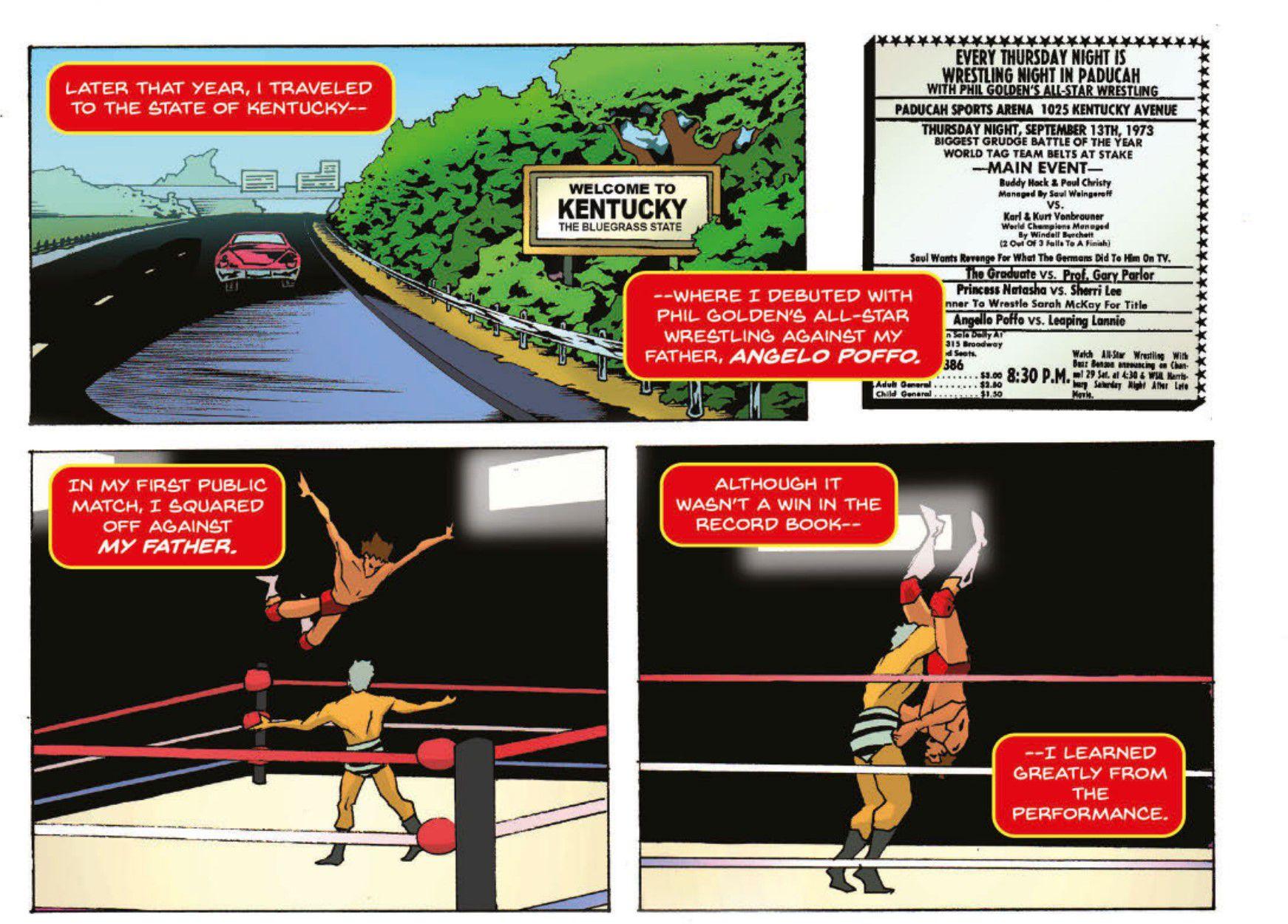
After training for a year under Angelo, Lanny’s unofficial debut was in a losing undercard match against his father in Paducah, Kentucky. He would then make his way to Georgia, where he competed in All-South Wrestling in Atlanta, and then to the Sheik’s Big Time Wrestling promotion in Detroit, where he and Angelo—Angelo came to the ring in a graduation cap and gown similar to what Lanny would later don in WWE—won the Detroit version of the NWA World Tag Team Championships from pioneering Black wrestler Bobo Brazil and “Flying” Fred Curry, son of hardcore legend “Wild Bull” Curry. In 1976, in a televised match on the iconic St. Louis Wrestling at the Chase show, Lanny lost to Terry Funk for the NWA Worlds Heavyweight Championship.
By 1974, Randy—who never got past the Class A minor leagues—had given up on baseball and fully turned his attention to the ring. Starting with Jim Crockett’s Mid-Atlantic Championship Wrestling, Lanny and Randy would team up for the better part of 1976. And when they disbanded in 1977, Lanny enjoyed success in a variety of other NWA territories, eventually receiving another shot at the NWA Worlds Heavyweight Championship, then held by Harley Race, and wrestling the champ to a time-limit draw.
In 1978, the three Poffos again joined forces, this time to form the outlaw International Championship Wrestling promotion based out of Lexington, Kentucky. ICW’s location put them squarely in the crosshairs of Jerry Jarrett’s NWA-sanctioned Continental Wrestling Association, which was headlined by Jerry “the King” Lawler. The Poffos’ challenge to the NWA was more spirited than most, lasting nearly six years and including an unsuccessful $2.4 million antitrust lawsuit charging nine wrestling promoters with monopolizing the business. Lanny and Randy, arguably in their athletic primes, constituted the beating heart of ICW; with two exceptions—future NWA Worlds Heavyweight champion Ron Garvin and future WWF jobber Paul Christy—either Lanny or Randy held the ICW Heavyweight Championship throughout the promotion’s existence, despite a roster that included Ox Baker, Pez Whatley, and “Cowboy” Bob Orton Jr.
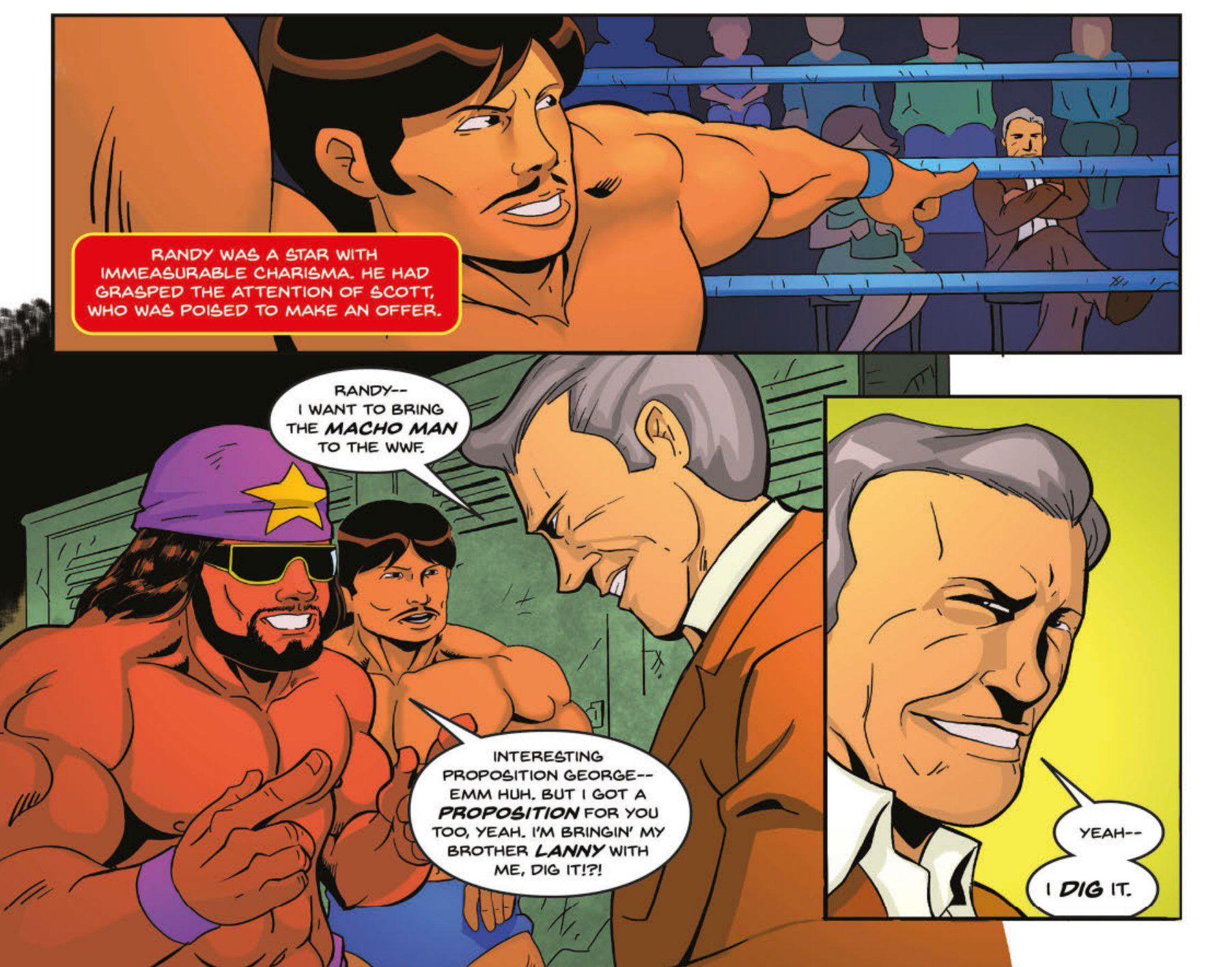
After ICW dissolved and was absorbed into the CWA, Randy and Lanny found themselves in a series of high-profile feuds with CWA talent, including tag team rivalries with the Rock ’n’ Roll Express as well as conflicts with top regional stars “Wildfire” Tommy Rich and “Hot Stuff” Eddie Gilbert. These matches put Randy—said by Lanny to be the one with the “it factor”—on the expanding WWF’s radar screen. When WWF booker George Scott offered Randy a deal, Randy insisted they take Lanny as well. Scott agreed, and the most memorable phase of Lanny’s career was about to begin.
At that point, it might have seemed like Lanny was destined for stardom: He could talk, he had a great build, and he was one of the few domestic wrestlers doing sentons and moonsaults in the early to mid-1980s (his moonsault, or “leaping backflip,” as announcer Vince McMahon called it, was arguably safer and smoother than the similarly sized Great Muta’s version of the move). The WWF didn’t pair him with Randy or even acknowledge their relationship, but Lanny had everything it took to succeed in the spotlight. However, as “Leaping” Lanny Poffo, he remained a good guy who merely wrestled in competitive matches. He built on that babyface gimmick, though, reading poems he had written, often poems that mocked the bad guy he was about to wrestle (an updated, hip-hop variation on this insult-comedy gimmick helped AEW’s the Acclaimed seize that promotion’s tag titles). These poems were affixed to Frisbees that Lanny would then toss into the crowd. The Frisbee tossing won him no small amount of attention; a fawning 1986 profile in The Dispatch described him as “gorgeous,” the “poet laureate of professional wrestling,” a “straight-A student,” a “fan of “Rudyard Kipling and Henry Wadsworth Longfellow,” and able to “recite all the presidents in order of their terms, and the states and capitals.”
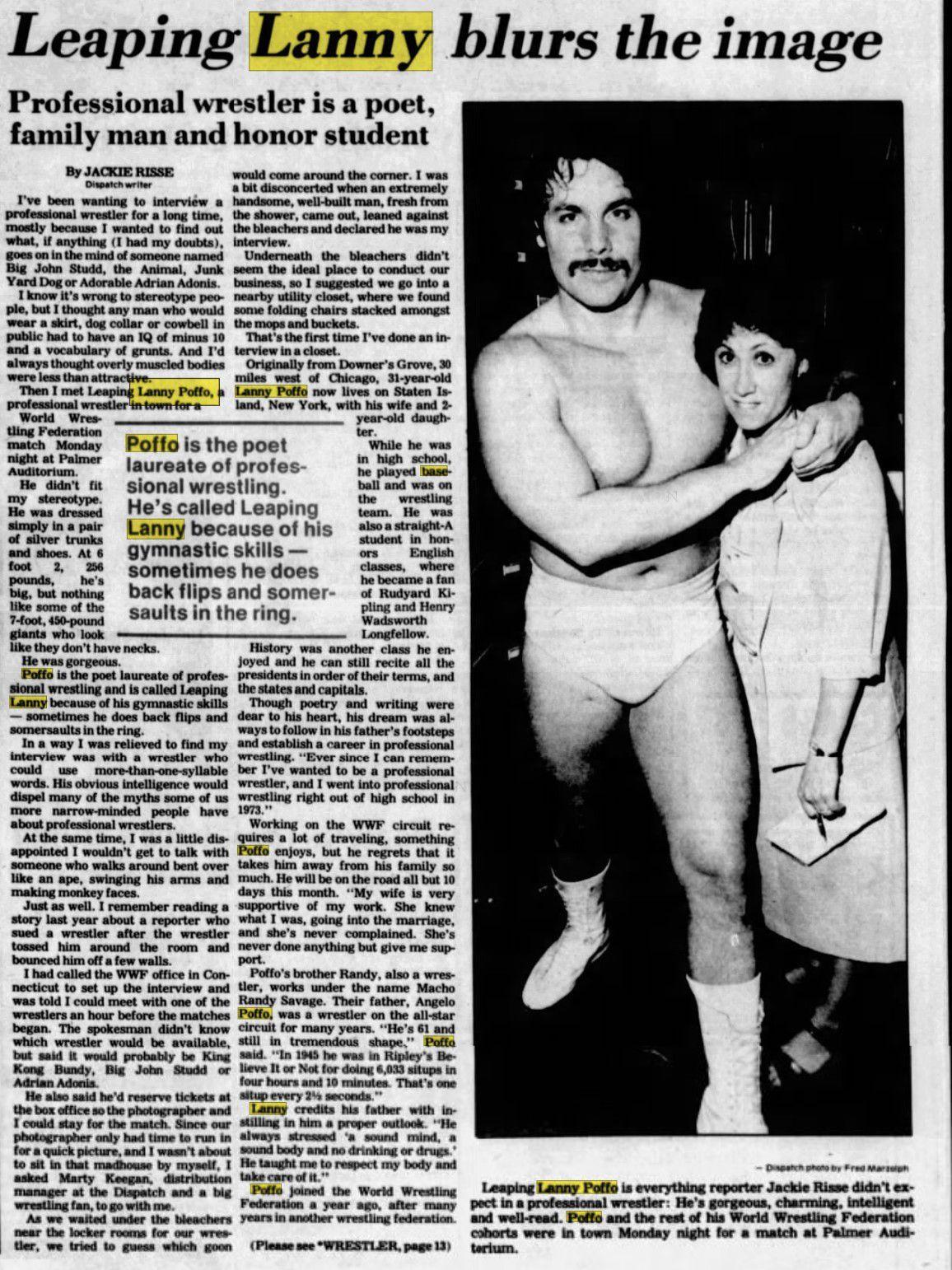
In the early days of WWF’s Saturday Night’s Main Event partnership with NBC—special event shows that generated ratings orders of magnitude greater than what wrestling produces today—good-guy Lanny stole the show on several occasions. On the first episode of SNME, he recited a poem at the enormous Uncle Elmer’s raucous real-life country wedding, even working in a reference to the “Holy Spirit” for the enormous television-viewing audience. Ten shows later, at a battle royal held in the Joe Louis Arena in Detroit in 1987, he helped put over future Hulk Hogan opponent Andre the Giant as a convincing bad guy by surreptitiously using a razor blade to slash his forehead, “getting color” on national television and making André’s headbutt—which sent him toppling out of the ring—look like a dangerous weapon. The headbutt did no actual damage, Lanny later explained, because Andre was a pro, and Lanny had bladed in plain sight in the middle of the ring a few moments earlier, confident that WWF’s production crew, working on a tape delay, wouldn’t show that footage.
Alas, Lanny’s good-guy run had a ceiling: He was the guy who beat perennial backslapping jobber Barry Horowitz and regularly lost to everyone else. He self-published a book of poetry, Wrestling With Rhyme, in 1988; the book is now extremely hard to find and can fetch upward of $290 whenever it appears on a site like Amazon.
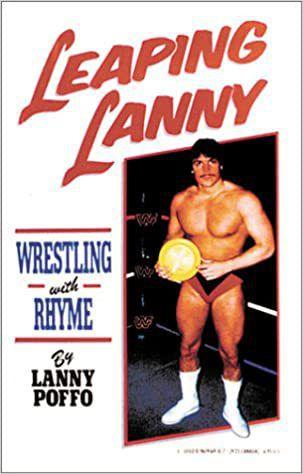
In 1989, Lanny worked with WWF ring announcer Howard Finkel to reinvent himself as a bad guy who would use his poetry to taunt and ridicule his good-guy opponents, brag about his intellect, and insult whichever city he happened to be performing in. Lanny recalled that Chief Jay Strongbow was dubious about whether this would succeed, which Lanny found amusing given that Strongbow, actually an Italian American wrestler named Joe Scarpa, had been a beloved babyface despite his bad-guy looks. In the Boston Garden on March 18, 1989, he offered his first crowd-baiting poem:
My name is Lanny Poffo and I always know what’s up.
The Bruins haven’t got a chance to win the Stanley Cup.
The Red Sox haven’t won in years and I hope they never do.
The Celtics are a travesty; the Patriots are too.
This wasn’t the sort of shocking material one might hear “Platinum” Max Caster use to trash Jeff Jarrett in 2023, but Lanny’s haughty delivery drew loads of boos from the capacity crowd, causing one fan to jump into the ring. He was reintroduced thereafter as the Genius, with the WWF—in its usual fashion—not calling back to his former persona. Lanny sported a gown and mortarboard, much like Angelo had in the 1970s, and amplified all his irritating mannerisms, developing a style of performance that was a cross between perfume-spritzing villain Gorgeous George’s and wrestling gymnast Ricki Starr’s. Additional touches, including frequently “skinning the cat,” or sliding out of the ring to work math problems and sketch battle plans intended to help him win the match, turned the Genius into a magnet for crowd heat.
Finally, Lanny began his ascent up the WWF card, culminating in a WWF World Heavyweight Championship match that aired November 25, 1989, on Saturday’s Night Main Event. There, the Genius achieved arguably his greatest career highlight: He defeated Hogan by count-out thanks to the timely interference of “Mr. Perfect” Curt Hennig, who showed up near the end to deface Hogan’s title belt with chewing gum before coldcocking him outside the ring with it. Everything about this match is perfect, in fact: Lanny’s poem before the bout (he rhymes Hogan’s “What are you gonna do?” with “incredible IQ”), his routine during the match (including an incredibly smooth kip-up, an effortless instance of “skinning the cat” back into the ring, a second-rope moonsault, and loads of begging off and mincing about the ring), and Hennig’s starring role in the convoluted finish.
Lanny stuck around for nearly three years, slowly making his way back down the card—his head would be shaved at WrestleMania VI by Brutus Beefcake after Beefcake defeated Mr. Perfect, and the Genius would be replaced by Bobby Heenan as Hennig’s manager thereafter—yet lingering on the main roster until his final appearance managing the Beverly Brothers at the 1992 Survivor Series. Always effective in whatever role he was given, Lanny spent most of 1993 and early 1994 on the sidelines, working some independent shows before briefly returning to the WWF in May of 1994.
Lanny would then spend five years in WCW, signing in 1995 and receiving regular paychecks until 1999 without wrestling a single match. Once again, Randy—who had somehow acquired the rights to the Gorgeous George gimmick, with the possibility that Lanny could take on that persona—had prevailed upon his employer to hire his talented younger brother. In this case, Lanny, who bleached his hair blond and trained diligently for his return to the ring, simply never received a call from WCW to wrestle, in spite of his presence on their payroll (a major problem for the company, particularly as its star-laden roster swelled toward the end of the decade). Eventually, Stephanie Bellars, who would serve as Randy’s valet in WCW, was dubbed Gorgeous George instead of Lanny.
This anticlimactic run of well-compensated inactivity marked the end of Lanny’s serious in-ring career. He continued to make sporadic in-ring appearances for various promotions, but the younger, bigger, and arguably more athletic of the Poffo brothers had entered another stage of his career. In this capacity—which expanded after the death of his father and the untimely passing of his brother a year later—he became the historian responsible for the Poffo legacy, giving countless interviews about the contributions of his more famous relatives and, to a lesser extent, his own.
John Crowther, who collaborated with Lanny to write his comic-book autobiography, said that was exactly how the unassuming Genius wanted it. That was why Lanny chose to end the illustrated story of his wrestling life not on an obvious personal high note, like his count-out win over Hogan, but with the speech he gave inducting his brother, Randy, into the WWE Hall of Fame:
In triumphant jubilation, we celebrate his name.
Finally, the Macho Man is in the Hall of Fame!
“At the many Florida convention appearances we did together before he relocated to Ecuador, I remember how generous Lanny was to his fans,” Crowther told me via email. “He never took money for personal gain for autographs, books, action figures, and so on, but only accepted donations to children’s charities on behalf of his brother, not himself. The pride he had for his father and particularly for his brother exceeded any pride he took in his own accomplishments.”
“Leaping” Lanny was a wrestling Genius who had everything it took to be a generational talent—looks, smarts, charisma, athleticism—but all he ever wanted to be was a Poffo.
Oliver Lee Bateman is a journalist and sports historian who lives in Pittsburgh. You can follow him on Twitter (@MoustacheClubUS) and read more of his work at oliverbateman.com. He blogs, vlogs, and podcasts at his Substack, Oliver Bateman Does the Work.